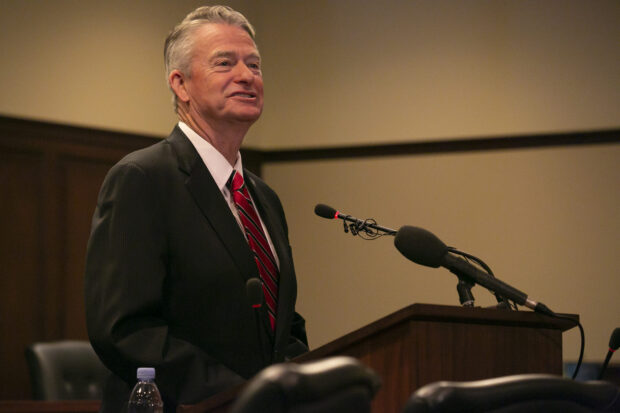The House Education Committee took up Gov. Brad Little’s five-year, $223 million plan to increase salaries for Idaho’s most experienced and effective educators, but took no vote Tuesday.
The committee spent about 90 minutes on the proposal, but adjourned for the House’s morning floor session.

One of the top education bills of the session, House Bill 523 would provide a path for experienced teachers who meet new performance criteria to earn up to $63,000 by 2024-25. Currently, state payouts for teacher salaries top out at $50,000.
The bill would add a new advanced professional rung, placed above the career ladder salary allocation system’s existing rungs for residency and professional teachers.
The bill would increase salaries incrementally over five years, launch a new accountability system and get away from paying teachers more for gaining another year of experience or continuing their education.
The recommendation came out of Little’s “Our Kids, Idaho’s Future” K-12 task force and enjoys support from the State Board of Education and Superintendent of Public Instruction Sherri Ybarra.
Greg Wilson, Little’s senior policy adviser for education, said the bill represents a shift — from a five-year effort to increase beginning teacher salaries to focusing on salaries for veteran educators.
“It shows a long-term commitment to educators across Idaho,” Wilson said. “Gov. Little is committed to improving student achievement and this bill assists districts and charters in recruiting and retaining quality educators.”
Educators from Rexburg, Nezperce, Kimberly and Teton County traveled to the Statehouse to testify in support of the bill.
“We’re investing in our students and our teachers by passing this bill,” Madison Middle School teacher Melanie Hammond said.
Angela Hoopes, who teaches at Driggs’ Teton Middle School, said her district struggles to retain its best teachers when they can cross the border to Wyoming and earn higher pay. Little’s bill would help Idaho schools compete, she said.
“I’ve lost really good teachers I teach with,” Hoopes said. “They are master teachers. They have gone over the hill (to work in Wyoming) and don’t come back.”
Nezperce Superintendent Shawn Tiegs said his district has three veteran teachers with more than 99 years of experience between them. He credited their leadership with increasing student achievement. He said passing the bill could help small, rural districts retain their best teachers by paying them better.
“I believe we will never completely fix that pay differential that exists… but this bill will alleviate that pressure that is felt by our teachers to move (in search of higher pay),” Tiegs said.
Despite widespread support, and a motion on the table to send the bill to the House floor, the committee did not vote. After a lengthy overview of the bill, committee members ate up time asking Wilson and other members of Little’s team questions about the bill’s mechanics.
Chairman Lance Clow, R-Twin Falls, decided to continue the hearing to Wednesday, noting several people were still waiting to testify when House Education adjourned.
The contrast between House Education and the Senate Education Committee is especially stark. While House Education consistently runs out of time and is scrambling to meet Monday’s target date for moving bills to the Senate, Senate Education is playing it cool. Senate Education did not meet last Wednesday, Thursday or Friday. It only briefly met Monday and it is not meeting Tuesday afternoon.
Senate Education Chairman Dean Mortimer, R-Idaho Falls, called this lull his committee’s reward for working hard earlier in the session.
On the other hand, House Education continues to meet daily and is looking at coming in a half hour earlier Wednesday. The HB 523 hearing is expected to resume at 8:30 a.m.
